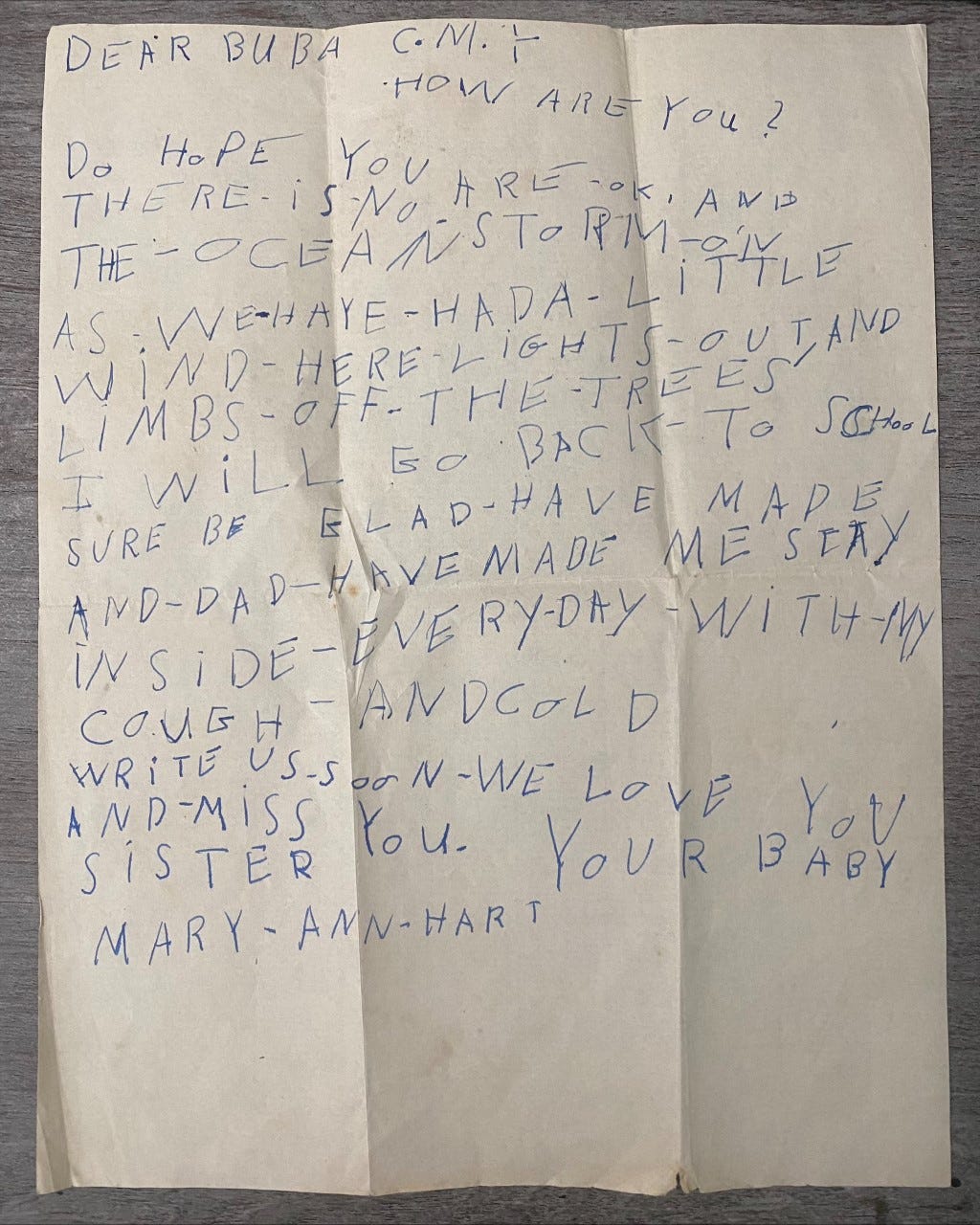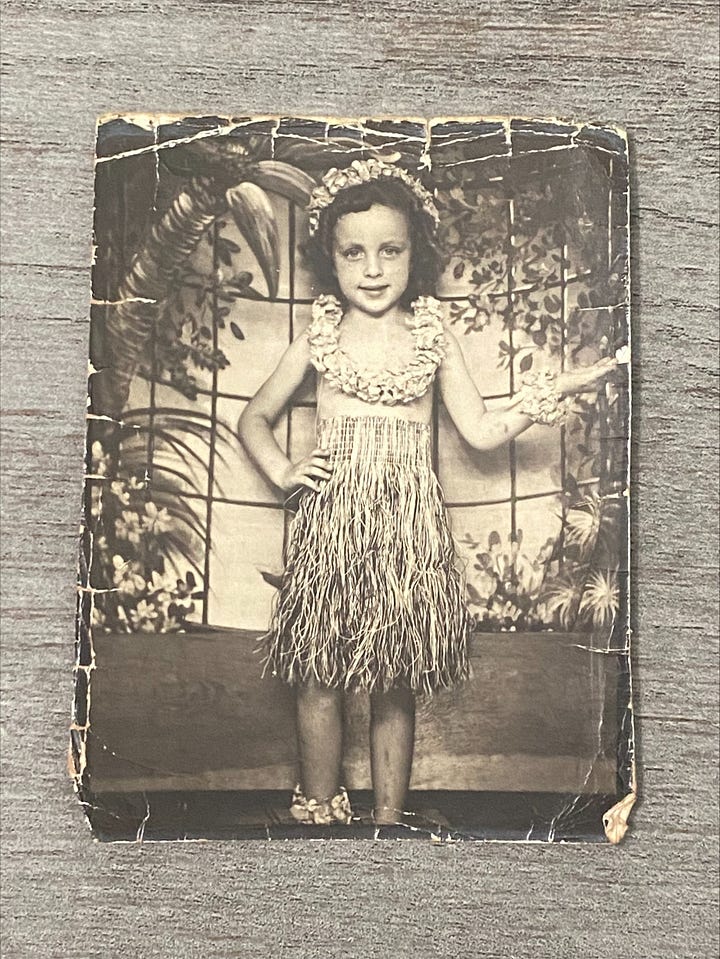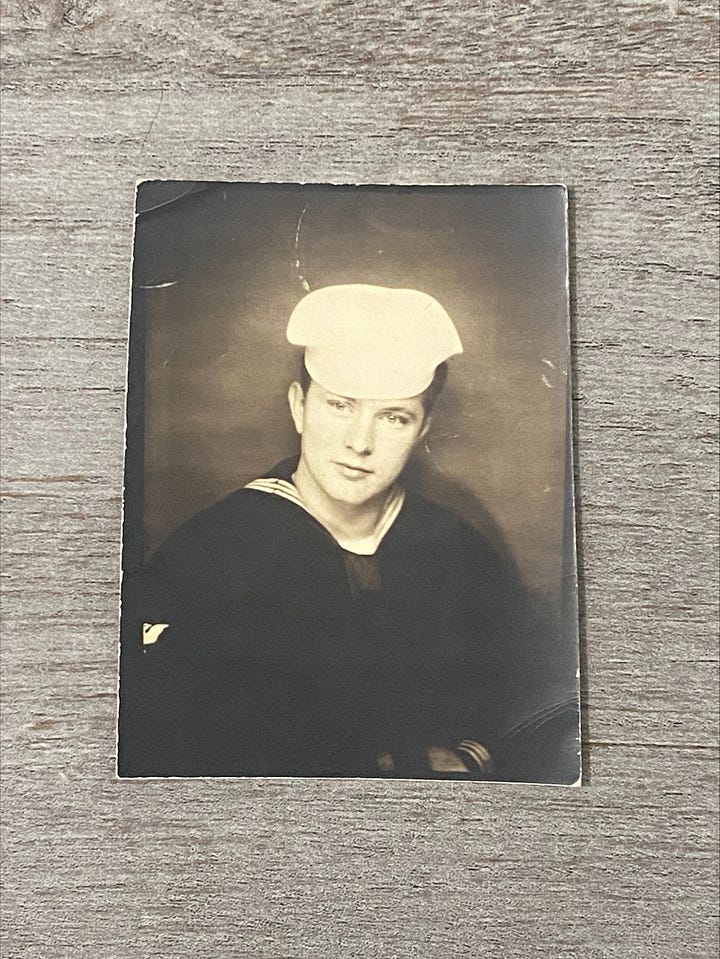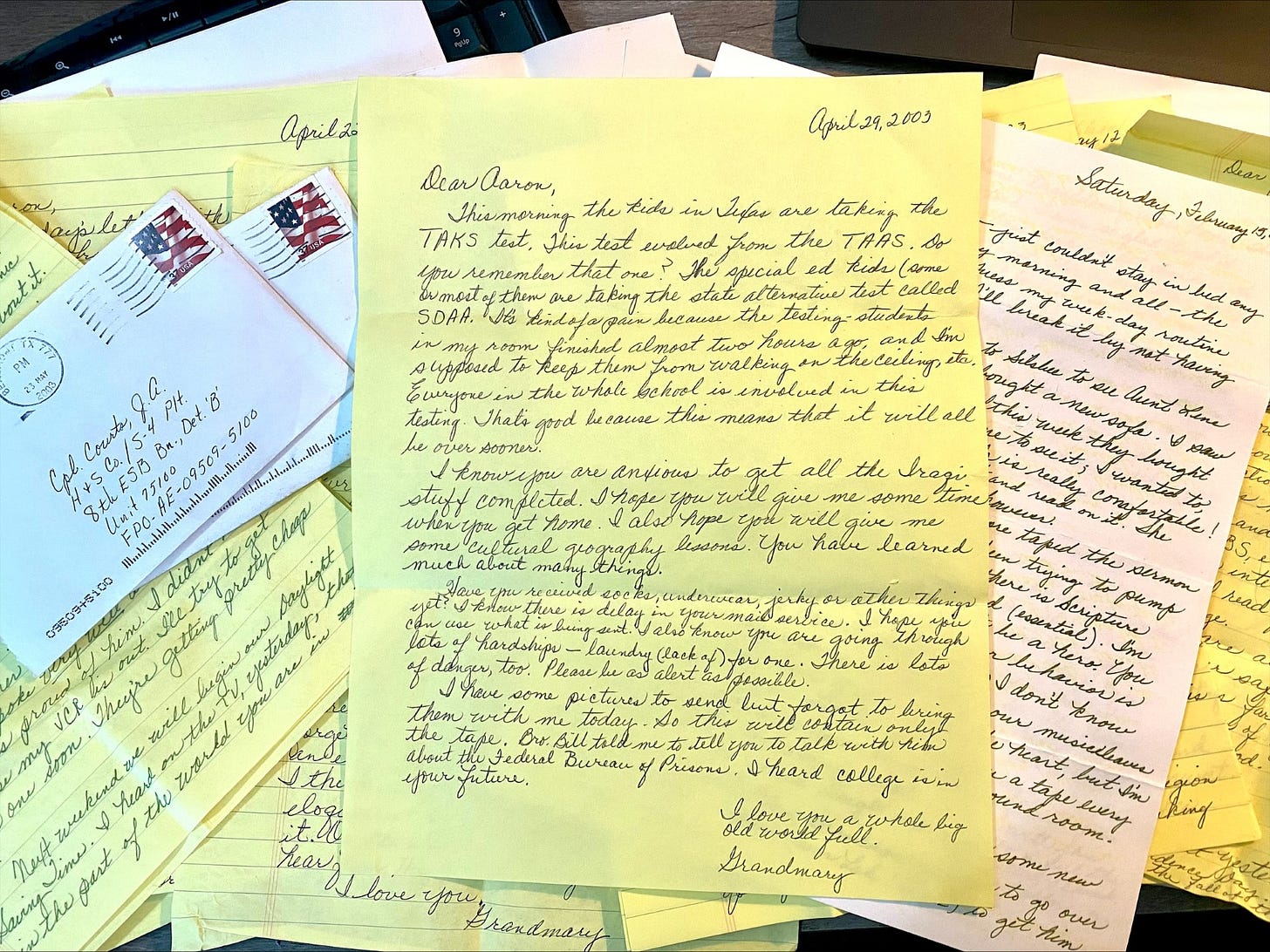The Essence of a Letter
Reflecting on letters from a girl, and grandmother, to her men at war
“There’s power in written word, Aaron, especially in a letter, and you’ll need stamps to share that with others.” - Mary Ann Hargraves
Who is thrilled to receive a letter? Everyone, of course, but someone has to write a letter for its power to be born. Personally, I enjoy writing letters and always have. I keep a book of stamps in my wallet and try to keep letter writing gear with me when I travel. It was my grandmother, Mary Ann Hargraves, or Grandmary as we call her, that encouraged my love of written word, and especially of written word in the form of a letter.
Where most people remember their parents forcing them to order a meal, or pay for goods themselves at a service counter, Grandmary took me to the post office and had me order a book of stamps. That is one of the first and fondest memories I have of spending time with her.
“There’s power in written word, Aaron…” Not the most profound statement, all things considered, but it was for me. Though it’s one of my oldest memories, it remains one of the clearest. Grandmary had stopped at a post office in Beaumont, Texas to mail a package and purchase her own stamps. As we entered the enormous lobby, the smell of paper and cardboard was the first thing I noticed. The clerk was the second. I’m sure she was smiling, but at the time, she seemed to be judging my very existence. The clerk looked more like a preacher standing atop a pulpit and towering over a congregation than she did a postal worker, and her booth was more lectern than counter. Grandmary handed me a few dollars and told me to go to the counter and pray… I mean ask to purchase a book of stamps.
I can’t remember if I prayed or not, but I did turn back to her midway, scared to approach the ominous clerk. Grandmary smiled and said it was fine; the lady was nice, and it would make her day to sell stamps to a boy so young who showed interest in mailing a letter. I walked towards the clerk as if she were a Postmaster General wielding an unorthodox authority to incarcerate. To my surprise and everlasting joy, I survived the harrowing ordeal. Afterwards, I’d insist that we would go back to the same post office, which I’m sure was an inconvenience since my grandmother lived in Rose City, and Vidor, the next town over, had a post office of its own. I would wait in line patiently, allowing others to skip my place, so I could say hi to the Postmaster terror turned sweet smiling stamp lady in a blue collared blouse. As mentioned, I have carried stamps with me ever since and each time I enter a post office to buy more, I think about my little old sweet stamp lady who helped my grandmother encourage me to share the power of written word and appreciate a letter.
I can’t remember who I wrote my first letter to. Knowing Grandmary, she probably had me write a thank you letter to one of my teachers; she was a teacher herself. However, I do remember sitting at her red square dining table and writing my first letter. I wrote it while she made biscuits from scratch, and when she was through, she methodically taught me how to address an envelope: determine if the correspondence was formal or informal, use the appropriate title to accompany the recipient’s name and address, apply the same steps for the return address, and then place the correct stamp, correctly. With that exercise complete, I ran to the mailbox and raised the flag hoping desperately to have beaten the mailman on his route. She didn’t need to write me then because I saw her most afternoons and almost every weekend, but in time, handwritten letters from Grandmary would become more precious than gold.
I enlisted in the Marine Corps when I turned seventeen and left for bootcamp a couple of days after my eighteenth birthday in the year 2000. Grandmary began writing me regularly then, and though she passed away in 2004, the number of letters she wrote me during my first enlistment far outnumbered the letters I received from anyone else— maybe everyone else— to this very day. I turn to her letters on occasion, when she is on my mind or if I want to be reminded of an earlier time in my life. When I do, her voice becomes audible again, and we might as well be driving to the post office to buy more stamps. I can hear her voice now just thinking about her letters.
I was reading through some of them a few weeks ago and remembered that I have a letter she wrote as a young girl. After digging through an ancient, blue-marbled, Samsonite suitcase that she gave me as a child, I found the letter I was looking for. It struck me that I might have the first letter she ever wrote, and after the terrible flooding that has plagued Southeast Texas and the Gulf Coast at large in recent years, it’s all but certain that I possess the earliest of her letters still in existence.
That letter was written to her older brother, C. M. Hart, a Petty Officer Second Class in the U. S. Navy during WWII, sometime around 1944. It is a touching letter from a “baby sister” to her “Dear Buba C.M.” It reminds me of the letters my baby sister wrote to me, her “Bubba,” while I was deployed to Iraq almost sixty years after Grandmary’s letter to her big brother.

Dear Buba C.M.,
How are you?
Do hope you are ok, and there is no storm on the ocean, as we have had a little wind here, lights out, and limbs off the trees. I will sure be glad [to] go back to school. [Mom] and Dad have made me stay inside everyday with my cough and cold.
Write us soon. We love you and miss you.
Your baby sister,
Mary Ann Hart
Without a date on the letter, I cannot be sure of when it was written, and therefore, never be sure if she saw him again. Although not a certainty, I believe it is likely that they did see one another again based on the records of Uncle C. M.’s approved leave dates. Regardless, I try not to think about this much, choosing instead to believe they did see each other again and again. For, although there is a last time for everything, a baby sister should always be able to play with her “Buba” one last time. What is tragically certain is that she would grow up without him. Uncle C. M. would succumb to injuries related to a fall while on liberty from in Seattle, Washington and die on Thursday, the 24th of January 1946. What is also certain, is that this letter was as much gold to him as her letters would become to me. The letter was returned to my great grandmother and great grandfather with his remains and personal effects thirteen days later. It is one of the very, very, few letters he kept.


Grandmary would write me much more than she was able to write her big brother. Fortunately, I’ve kept every letter that she wrote me. In them, she would talk about the weather, minor disagreements with my mother or grandfather, happenings within the church or school, and playfully chastise me for failing to communicate that which was most important. As I moved from one Marine school to another, and eventually, one Marine unit to the next, she would ask questions about the training, what church service I was attending, and ask about my buddies in the Corps. When I deployed, she would send care packages, information from local and national news, tapes of the church sermons, and excerpts of scripture she felt were most appropriate. She would tell me about this person, or that person, and how proud everyone was of me and all of the other troops. She was always open and honest and would express her fears for me and concern for others, at home and deployed. She was always supportive and encouraging and made me laugh more times than not. Regardless of the contents, I always, always, felt better after receiving a letter from her.

Dear Aaron,
This morning the kids in Texas are taking the TAKS test. This test evolved from the TAAS. Do you remember that one? The special ed kids (some or most of [them)] are taking the state alternative test called SDAA. It’s kind of a pain because the testing-students in my room finished almost two hours ago and I’m supposed to keep them from walking on the ceiling, etc. Everyone in the whole school is involved in this testing. That’s good because this means that it will all be over sooner.
I know you are anxious to get all the Iraqi stuff completed. I hope you will give me some time when you get home. I also hope you will give me some cultural geography lessons. You have learned much about many things.
Have you received socks, underwear, jerky or other things yet? I know there is a delay in your mail services. I hope you can use what is being sent. I also know you are going through lots of hardships— laundry (lack of) for one. There is lots of danger, too. Please be alert as possible.
I have some pictures to send but forgot to bring them with me [today, so] this will contain only the tape. Bro. Bill told me to tell you to talk with him about the Federal Bureau of Prisons. I heard that college is in your future.
I love you a whole big old world full,
Grandmary
A few years ago, I was going through her letters and came across one that appeared to have re-sealed itself. Marines are usually stationed near the Ocean, so I wasn’t too surprised that humidity may have caused the letter to re-seal. I usually tear a small strip off of the far-left edge when opening a letter, so it did strike a bit odd that I would have opened this envelope along its flap. I find that an envelope maintains its structure and protects the letter much better if the back side is left sealed and the letter opened along a side edge. By opening the left edge, the post mark is kept intact, though you run the risk of losing part of the sender’s information. When carelessness turns the return address into a two-piece jigsaw puzzle, I tuck the loose piece inside of the envelope with the letter so the sender’s information can be revisited in the future. This envelope’s left edge was secure. “Strange,” I thought, again, and investigated the envelope more closely. It hadn’t re-sealed itself— this letter had never been opened at all.
My grandmother passed away more than six years prior and somehow this letter had remained undiscovered. It was covered with mail forwarding marks from various installation mail rooms. It must have arrived at one of my early postings just after I had left. If that was the case, it would have been forwarded to the next school and arrived there too late, the next unit, again, too late, always playing catch up, yet missing me by weeks or even days. In truth, I can’t remember ever receiving it. My best guess is that it was eventually delivered to my barracks room and a roommate put it with my stuff. Either way, the result was that Grandmary had written me another letter. One last letter, as it were, from beyond the grave. I almost opened it on the spot. I wanted to. I desperately wanted to, but I was heading home for Christmas in a few weeks and thought about how special it could be if I were able to let my family hear her voice as I do, one last time, as well.
I was torn. As I’ve said, Grandmary was honest with me. She confided in me. Was I betraying her confidence? What had she written in this letter? Had she vented or complained about my mother or grandfather or siblings, again? It didn’t happen too often, but would they want to hear it if that was the case? I slept on it, and in the end, decided that she would want to hear from Uncle C. M., or myself, if thew roles were reversed. She would want to hear anything, even if it was a complaint. She would love to hear anything, as I would, and determined that my family would too.
I opened and read the letter to them after all the other gifts were shared. I was happy that she mentioned most of them in the letter, absent any complaints (for all the aforementioned belief in their wanting to hear her voice again, I was actually quite nervous that someone’s feelings would be hurt). There were tears and smiles and hugs, and some sadness and a lot of joy, and it was a very Merry Christmas, indeed.
I think that is the last of the gems from my grandmother. All the other letters I have are opened and have been read dozens of times, and yet, I still examine the envelopes closely, hopeful for another miracle. Nevertheless, that letter inspired a small tradition. Every once in a while, I write a letter to myself, or to my wife or kids, and seal it before mixing it in with all of my other letters. My hope is that one day, I can give them what Grandmary gave me: a reminder of my jokes or words of encouragement, a reminder of my voice, a reminder of my love.
So, what is the essence of a letter? I believe the essence of a letter is charity— the charity of oneself. I believe the truest essence of a letter is Self.
Semper Fidelis.




Gosh what an absolutely beautiful reflection and declaration of love toward your Grandmother Mary. I cannot understand but a small piece of how meaningful it must have been to receive those handwritten letters and care packages when you were in Iraq. Thank you for your service.
I grew up on the other side of the world, with a very similar Grandmother. Her name was Gunhild, and she married a farmer in a very small village in Finland. When I moved to the US she would write me letters that were very similar to the ones you received from your Grandmother. And -- my Grandma would send me and my husband knitted wool socks even if we lived in Southern California then! We loved them, and still have many pairs that are in use.
Again, great story about letters. Thank you for sharing.
So beautiful! Thank you for sharing!!